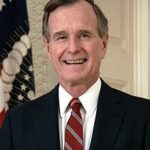President George H.W. Bush faced one of his presidency’s most damaging crises following Hurricane Andrew’s devastation of South Florida in August 1992. The Category 5 hurricane struck Homestead and surrounding areas with unprecedented force on August 24. Initial federal response proved sluggish and poorly coordinated. 🌪️
The Hurricane Andrew Response Disaster
FEMA’s initial assessment severely underestimated the storm’s impact. Federal officials took nearly four days to recognize the crisis’s true scope. Local authorities repeatedly requested additional federal assistance while residents remained without basic necessities. Bush’s administration initially relied on standard bureaucratic procedures rather than emergency protocols.
Presidential Leadership Crisis
Bush delayed his personal visit to the disaster zone for several critical days. His August 28 visit came too late to demonstrate immediate presidential concern. ⚠️ The president appeared disconnected from the human suffering unfolding in South Florida. Media coverage highlighted the stark contrast between local devastation and federal inaction.
FEMA’s Institutional Failures
The Federal Emergency Management Agency lacked proper disaster response coordination. Communication breakdowns prevented effective resource deployment. 📊 Over 180,000 people were left homeless while federal aid remained bottlenecked in bureaucratic processes. These failures exposed fundamental weaknesses in America’s disaster preparedness infrastructure.
Impact:
The Hurricane Andrew response failure created lasting political and institutional consequences that extended far beyond Bush’s presidency. His approval ratings plummeted during a crucial election year. The disaster response became a defining campaign issue against Bush’s leadership competence. 📉
Electoral Consequences
Bush’s mishandling of the disaster contributed significantly to his 1992 election defeat. Florida voters, witnessing federal inadequacy firsthand, turned against the incumbent president. The Hurricane Andrew response reinforced perceptions of Bush as disconnected from ordinary Americans’ struggles. Campaign opponents successfully weaponized the federal failure against Bush’s reelection bid.
FEMA Transformation
The crisis prompted comprehensive reforms of federal emergency management. Congress increased FEMA funding and restructured its operational protocols. 🔥 New leadership transformed the agency from a bureaucratic obstacle into a more responsive organization. These changes established precedents for future disaster response improvements under subsequent administrations.
Long-term Government Accountability
The disaster established new expectations for presidential crisis leadership. Future presidents learned to demonstrate immediate, visible concern during natural disasters. Media coverage patterns changed to emphasize rapid federal response timing. 🌪️ The Hurricane Andrew response became a cautionary tale taught in public administration programs nationwide. This crisis fundamentally altered how Americans evaluate presidential performance during national emergencies.
